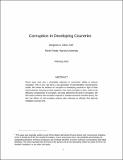Corruption in Developing Countries
Author(s)
Olken, Benjamin A.; Pande, Rohini
DownloadOlken_Corruption in.pdf (163.3Kb)
OPEN_ACCESS_POLICY
Open Access Policy
Creative Commons Attribution-Noncommercial-Share Alike
Terms of use
Metadata
Show full item recordAbstract
Recent years have seen a remarkable expansion in economists' ability to measure corruption. This in turn has led to a new generation of well-identified, microeconomic studies. We review the evidence on corruption in developing countries in light of these recent advances, focusing on three questions: how much corruption is there, what are the efficiency consequences of corruption, and what determines the level of corruption? We find robust evidence that corruption responds to standard economic incentive theory but also that the effects of anticorruption policies often attenuate as officials find alternate strategies to pursue rents.
Date issued
2012-04Department
Massachusetts Institute of Technology. Department of EconomicsJournal
Annual Review of Economics
Publisher
Annual Reviews
Citation
Olken, Benjamin A. and Rohini Pande. "Corruption in Developing Countries." Annual Review of Economics (2012) 4:479–509. Copyright © 2012 by Annual Reviews.
Version: Author's final manuscript
ISSN
1941-1383
1941-1391